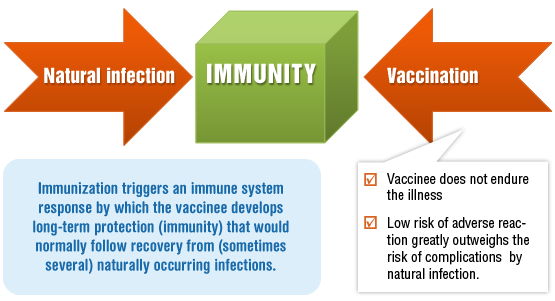How vaccines work
Key point
Vaccines stimulate the immune system to develop long-lasting immunity against antigens from specific pathogens.
The goal of all vaccines is to elicit an immune response against an antigen so that when the individual is again exposed to the antigen, a much stronger secondary immune response![]() Immune responseThe body's defense against foreign objects or organisms, such as bacteria, viruses or transplanted organs or tissue. will result. Vaccines contain the same antigens that are found on pathogens that cause the associated disease, but exposure to the antigens in vaccines is controlled. By priming
Immune responseThe body's defense against foreign objects or organisms, such as bacteria, viruses or transplanted organs or tissue. will result. Vaccines contain the same antigens that are found on pathogens that cause the associated disease, but exposure to the antigens in vaccines is controlled. By priming![]() PrimingThe process of artificial induction of immunity, in order to protect against infectious disease. Priming the immune system involves sensitizing or stimulating an immune response with an antigen that can produce immunity to a disease-causing organism or toxin (poison). Vaccinations involve the administration of one or more of these antigens, which can be administered in several forms. the immune system through vaccination, when the vaccinated individual is later exposed to the live pathogens in the environment, the immune system can destroy them before they can cause disease.
PrimingThe process of artificial induction of immunity, in order to protect against infectious disease. Priming the immune system involves sensitizing or stimulating an immune response with an antigen that can produce immunity to a disease-causing organism or toxin (poison). Vaccinations involve the administration of one or more of these antigens, which can be administered in several forms. the immune system through vaccination, when the vaccinated individual is later exposed to the live pathogens in the environment, the immune system can destroy them before they can cause disease.
Thus, there are two ways of acquiring immunity to a pathogen — by natural infection and by vaccination. Natural infections and vaccines produce a very similar end result — immunity — but the person who receives a vaccine does not endure the illness and its potential life-threatening complications. The very low risk of an adverse event caused by a vaccine greatly outweighs the risk![]() RiskThe probability that an individual will experience a certain event during a defined period of time. of illness and complications caused by natural infection. The following pages will discuss in further detail the attributes of vaccines and the characteristic causes for adverse events.
RiskThe probability that an individual will experience a certain event during a defined period of time. of illness and complications caused by natural infection. The following pages will discuss in further detail the attributes of vaccines and the characteristic causes for adverse events.


